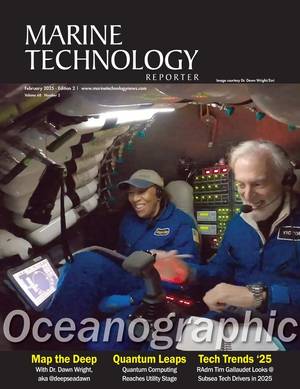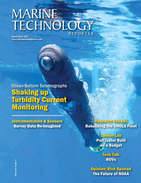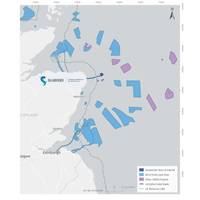
Global Maritime Tapped to Support Floating Wind Project
Wind Farm, in partnership with UHI is deploying environmental monitoring equipment alongside its metocean survey; as part of this an echosounder will be deployed on the seabed close to a FLiDAR buoy.Global Maritime will provide design services and advice with regards to the necessary deployment and recovery equipment , and riser and marker buoys for the PREDICT Echosounder frame, as well as the development of the deployment and recovery procedure for the echosounder.To be located 35 km off the coast of Peterhead, the 100 MW Salamander floating offshore wind farm will generate enough green energy to power
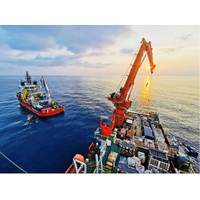
Chevron Awards InterMoor Decommissioning Contract
pipelines; disconnection and removal of Single Point Mooring (SPM) and associated subsea infrastructure; and topside modifications work.As in the first phase, InterMoor will use cutting tools provided by its sister company Claxton. Aquatic will provide subsea umbilicals, risers and flowlines (SURF) recovery equipment and UTEC plans to provide the survey spread
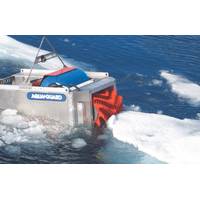
'Roomba' in the Arctic
the event of a spill. Actually, and to demonstrate how closely this natural environment was reviewed, the Healy team did find a tiny sheen of oil. They concluded it came from a hydraulic fitting. Quantity: a few drops only. In an ice-strewn environment, the independent mobility of the oil recovery equipment is critical, so the cutter or icebreaker does not need to move, reposition or otherwise control the skimmer. When the icebreaker moves it changes the seascape, pushing the surrounding ice and potentially eliminating the chance to recover pockets of oil. Similarly, by remaining stationary
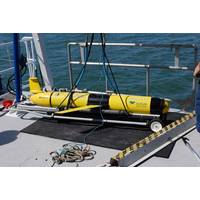
Oil Spill Detection: Remote Sensing Equipment Tested
carefully controlled conditions and with approval from the Marine Management Organization (MMO) following a rigorous planning and stakeholder consultation process. On hand was the full complement of oil spill response equipment and personnel, including a purpose-equipped vessel, containment and recovery equipment and U.K. approved dispersant. “Achieving maximum effectiveness in response to an oil spill incident is based on prior preparedness and understanding the capabilities of the equipment contained within our ‘response toolkit’. As a result, we are constantly reviewing
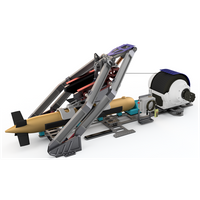
Canadian Government Backs Kraken
launch and recovery system is to enable an unmanned vehicle and its payloads to be brought aboard a host ship safely, efficiently and without damage. Next-generation surface vessels will carry a variety of unmanned vehicles and modular mission packages that will require specialized launch and recovery equipment. Karl Kenny, Kraken's President and CEO, said, "In both military and commercial markets, unmanned surface and underwater vehicles are the way of the future and present a wide range of revenue opportunities. Having in-house capability to design and manufacture Autonomous Launch
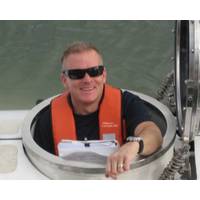
OceanGate Announced Two New Hires
mission objectives during submersible expeditions. Tony Nissen joins OceanGate as Director of Engineering to provide leadership in the research and development, operation, design and troubleshooting of all OceanGate manned submersibles and their supporting assets, including launch and recovery equipment. OceanGate recently conducted an expedition to capture detailed closeup sonar scans of the legendary shipwreck Andrea Doria near Nantucket. The company is also building Cyclops 2, a five-person manned submersible that will be capable of reaching depths of 13,000-feet. Lochridge
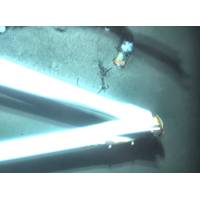
Another Mission Needed to Recover El Faro’s VDR
by the NTSB showed that the VDR appears to be attached to a steel beam connected to the mast structure. “Now that we have been able to see just how the VDR is oriented relative to the mast structure, it’s clear that we’re going to need specialized deep-water salvage recovery equipment in order to bring it up,” said Brian Curtis, Acting Director of the NTSB Office of Marine Safety. “Extracting a recorder capsule attached to a four-ton mast under 15,000 feet of water presents formidable challenges, but we’re going to do everything that is technically feasible
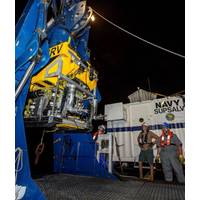
SUPSALV & Finding El Faro
physical assets under your guidance. SUPSALV has more than 565 military, civil servants, and full time contracted employees supporting our Washington, District of Columbia headquarters office, our Naval Experimental Dive Unit research laboratory in Panama City, Florida, our deep ocean search and recovery equipment program, our Emergency Ship Salvage Material (ESSM) warehouse system, diving engineering services, and our world-wide, underwater hull cleaning services for fleet vessels. Our facilities include a headquarters office, eight ESSM warehouses and support centers around the world, a Deep Ocean
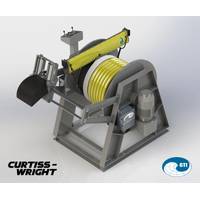
Curtiss-Wright, Geospectrum Technologies Collaborate
and weight, TRAPS will be the first towed active/passive sonar system to enable smaller navies, such as those operating frigates, corvettes, coastal patrol vessels, and ships of opportunity, to perform effective ASW operations. Unlike towed sonar systems that require heavy and complex launch and recovery equipment, TRAPS is the first reelable towed system that features a vertical active source combined with a high performance passive towed array, all handled “in-line” on a lightweight and easy to use winch system. "Curtiss-Wright is excited to be working with GeoSpectrum Technologies
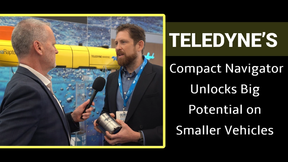
 February 2025
February 2025
